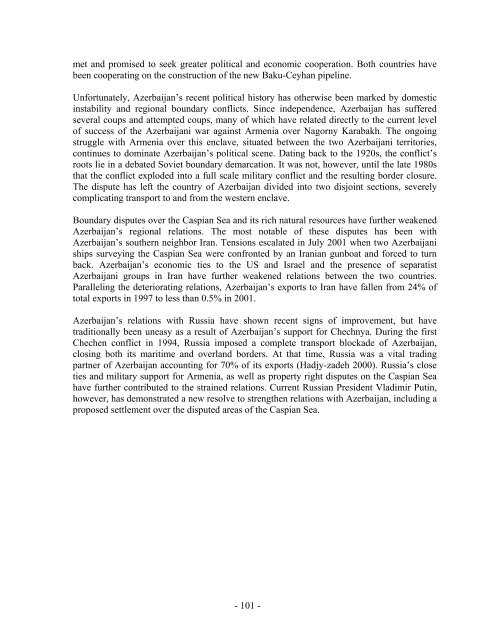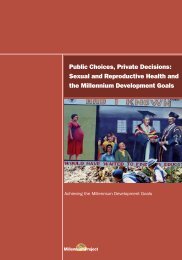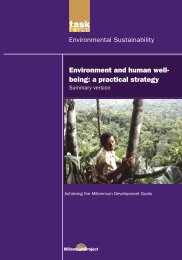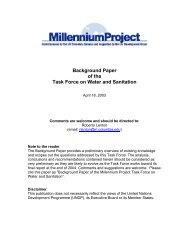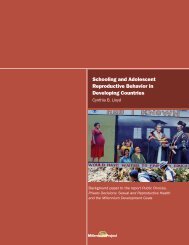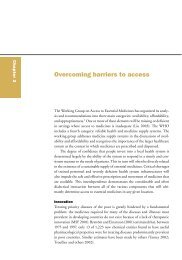the challenges facing landlocked developing countries: a case study ...
the challenges facing landlocked developing countries: a case study ...
the challenges facing landlocked developing countries: a case study ...
You also want an ePaper? Increase the reach of your titles
YUMPU automatically turns print PDFs into web optimized ePapers that Google loves.
met and promised to seek greater political and economic cooperation. Both <strong>countries</strong> have<br />
been cooperating on <strong>the</strong> construction of <strong>the</strong> new Baku-Ceyhan pipeline.<br />
Unfortunately, Azerbaijan’s recent political history has o<strong>the</strong>rwise been marked by domestic<br />
instability and regional boundary conflicts. Since independence, Azerbaijan has suffered<br />
several coups and attempted coups, many of which have related directly to <strong>the</strong> current level<br />
of success of <strong>the</strong> Azerbaijani war against Armenia over Nagorny Karabakh. The ongoing<br />
struggle with Armenia over this enclave, situated between <strong>the</strong> two Azerbaijani territories,<br />
continues to dominate Azerbaijan’s political scene. Dating back to <strong>the</strong> 1920s, <strong>the</strong> conflict’s<br />
roots lie in a debated Soviet boundary demarcation. It was not, however, until <strong>the</strong> late 1980s<br />
that <strong>the</strong> conflict exploded into a full scale military conflict and <strong>the</strong> resulting border closure.<br />
The dispute has left <strong>the</strong> country of Azerbaijan divided into two disjoint sections, severely<br />
complicating transport to and from <strong>the</strong> western enclave.<br />
Boundary disputes over <strong>the</strong> Caspian Sea and its rich natural resources have fur<strong>the</strong>r weakened<br />
Azerbaijan’s regional relations. The most notable of <strong>the</strong>se disputes has been with<br />
Azerbaijan’s sou<strong>the</strong>rn neighbor Iran. Tensions escalated in July 2001 when two Azerbaijani<br />
ships surveying <strong>the</strong> Caspian Sea were confronted by an Iranian gunboat and forced to turn<br />
back. Azerbaijan’s economic ties to <strong>the</strong> US and Israel and <strong>the</strong> presence of separatist<br />
Azerbaijani groups in Iran have fur<strong>the</strong>r weakened relations between <strong>the</strong> two <strong>countries</strong>.<br />
Paralleling <strong>the</strong> deteriorating relations, Azerbaijan’s exports to Iran have fallen from 24% of<br />
total exports in 1997 to less than 0.5% in 2001.<br />
Azerbaijan’s relations with Russia have shown recent signs of improvement, but have<br />
traditionally been uneasy as a result of Azerbaijan’s support for Chechnya. During <strong>the</strong> first<br />
Chechen conflict in 1994, Russia imposed a complete transport blockade of Azerbaijan,<br />
closing both its maritime and overland borders. At that time, Russia was a vital trading<br />
partner of Azerbaijan accounting for 70% of its exports (Hadjy-zadeh 2000). Russia’s close<br />
ties and military support for Armenia, as well as property right disputes on <strong>the</strong> Caspian Sea<br />
have fur<strong>the</strong>r contributed to <strong>the</strong> strained relations. Current Russian President Vladimir Putin,<br />
however, has demonstrated a new resolve to streng<strong>the</strong>n relations with Azerbaijan, including a<br />
proposed settlement over <strong>the</strong> disputed areas of <strong>the</strong> Caspian Sea.<br />
- 101 -


